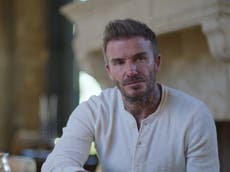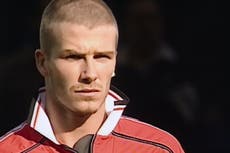‘I felt like I was David Beckham’s therapist’: Inside the making of Netflix’s new documentary ‘Beckham’
Director and ‘Succession’ star Fisher Stevens assumed David Beckham was a ‘shallow person without much to say’, he tells Louis Chilton. More than 30 hours of interviews with the superstar for a new Netflix documentary convinced him otherwise


For three decades, David Beckham has lived his life in the scope of a camera. Since he made his footballing debut for Manchester United in 1992, images of the generational England winger have seared themselves onto our national psyche. Beckham in 1996, arms in the air at 10 and two, having just walloped the ball in from the halfway line. Beckham at the World Cup in 1998, prone on the ground, kicking out at Diego Simeone in a red card-soliciting act of petulance. Beckham and his bride Victoria in 1999, sat on twin thrones at their lavish celebrity wedding. Beckham in 2003, wound across his eyebrow, after a rumoured fight with Sir Alex Ferguson, in which the Man U manager was said to have launched a boot at him. Beckham in 2012, rebuilt and re-embraced, speeding up the Thames with the Olympic torch. He is a man of moments. Such is the stuff from which icons are made.
But Beckham is more than just these images. Netflix’s new four-part documentary, Beckham, attempts to chart the inner life of the ex-footballer: the ups and downs of his marriage to Spice Girls singer Victoria Beckham; his private fears; and – still in some ways underestimated to this day – his rare, brilliant sporting talent. “It’s a love story, and a story of fathers and sons,” Fisher Stevens, Beckham’s director, tells me. “A boy from humble means in east London falls madly in love with football, then falls madly in love with a woman, and then falls madly in love with his family, and falls out with his father figure.” It almost has the air of a Greek tragedy – and I don’t mean the 2001 World Cup qualifier.
Beckham follows its subject’s journey from child prodigy to sporting sensation to global celebrity. We see his glory in Manchester, his big-money move to Spain, his sensational switch to MLS, when the US league was still in its infancy, followed by his contentious return to Europe. The doc goes all the way up to his current role as the president of Inter Miami CF, a position that saw him bring Lionel Messi, the man many regard as the greatest footballer of all time, to the States just a few months ago. “Through it all [Beckham] tries to hold on,” Stevens continues. “Sometimes he’s floating through and sometimes he’s holding on for dear life.”
It’s fair to say that Beckham paints an affectionate portrait, but Fisher insists that it veers clear of hagiography. “I told him, ‘Look, man. You’re so branded, so coiffed, so curated. If we work together, it can’t be that. I want to get to the essence of your real demons and fears. I want to get deep with you.’ And he said, ‘I want that.’”
As well as directing films such as Stand Up Guys and the 2016 climate change documentary Before the Flood, Stevens is a quietly prolific actor, recently appearing as Kendall Roy’s corporate lapdog Hugo in Succession. It was, he says, his involvement with the HBO TV show that led him to work with the Beckhams. At the time, the footballer was seeking a documentarian for a new Netflix project, and had approached Fisher because he thought an American would bring less “baggage”. “I talked football every week with [Succession creator Jesse Armstrong and writer-producer Tony Roche],” Fisher explains. “And they were like, ‘You have to do it. His life is crazy – the red card; Greece.’ I had no idea what they were talking about. I’m an American idiot. But then I went online and started researching and I was like, ‘Jesus, f***’.”
The concerns about “baggage” were, in Beckham’s case, well founded. As the first two episodes of Beckham document in depth, the golden generation’s poster boy was vilified by the press after getting a red card against Argentina at the 1998 World Cup. Death threats were sent, an effigy hanged in the street. Football still often seems like a sport wedged into outdated attitudes, but the comparatively compassionate public and media responses to, say, Bukayo Saka, Marcus Rashford and Jadon Sancho’s Euro 2020 penalty shootout misses, or Lauren James’s Beckham-esque red card at this year’s Women’s World Cup, shows just how much has changed since Beckham’s days.
Stevens adds that Beckham’s “emotional range” was “quite shocking”: the footballer is seen opening up on camera in a way that he seldom has in the past. “I don’t think that was easy for him,” he adds. “Before I met him, I assumed he was this shallow person without much to say, whose life was kind of perfect. And I realised that that’s not the case at all.” The documentary as a whole comprises current and archive footage of the Beckhams, interspersed with “talking head” interviews with some of football’s biggest names, including Ferguson, Simeone, Roberto Carlos, Luis Figo, and Cristiano Ronaldo. Oh, and Gary Neville. Sequences are punctuated with uncannily intimate close-ups.

For the series, Stevens conducted over 30 hours of interviews with the man himself, over more than 10 sessions. Victoria Beckham, meanwhile, sat down for around 15 hours of her own. “[Victoria] has a reputation of being kind of tough and sour,” Stevens says. “She was never like that with me. Funny, witty, fast. Unlike David, she was much more used to being reflected. David never had therapy. I felt at times like I was his therapist. Victoria, as she admits in the film, has had therapy, and was much more used to self-reflection.”
Claims of marital infidelity by Beckham, which dominated tabloid headlines for a spell back in 2004, are addressed in the series – the reports, not the alleged affair itself. “It felt like the world was against us,” he tells Stevens. “I think we both felt at the time that we were not losing each other but drowning.”
Of course, Beckham’s reputation would recover from the scandal; over the following two decades, he consolidated his reputation as one of the foremost statespeople of British sport. Despite his more or less full-fledged induction into the member’s club of National Treasuredom, though, Beckham has never fully shrugged off his capacity for controversy. In 2022, he faced stern condemnation for serving as an ambassador to the Qatari World Cup, due to the country’s history of human rights abuses; the comedian Joe Lycett attracted widespread coverage with a publicity stunt in which he asked Beckham to renounce the endorsement, or he would shred £10,000 of his own money. (Beckham didn’t respond, though Lycett donated the money to charity after initially faking its destruction.)
That’s his life, right? They talk s*** about him doing this and that and then they love him for doing something else
Stevens says he recorded Beckham speaking about the subject, but opted not to include the footage in the finished documentary. “It just felt kind of dated,” he says. “Honestly, if I had another episode, we could have gotten into that. But it just didn’t feel as relevant. When you’re talking about a guy’s 48 years, that was [just] a moment.”
The filmmaker also cites Beckham’s brief move to Qatari-owned French football club Paris Saint-Germain in 2013. “It’s a complex thing,” Stevens adds. “But that’s his life too, right? They talk s*** about him doing this and that and then they love him for doing [something else]. So who knows what’ll be the next thing?” He pauses. “Maybe that’ll come out in the sequel. After all, this guy is only 48 years old. He’s still got a whole other one or two acts.”
It is, as they say, a game of two halves. And unlike in 1998, Beckham doesn’t seem like he’ll be leaving the pitch anytime soon.
‘Beckham’ is streaming now on Netflix






Join our commenting forum
Join thought-provoking conversations, follow other Independent readers and see their replies
Comments